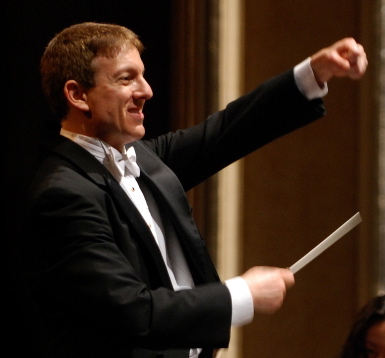Chicago Philharmonic celebrates ancient inspirations from Orff to Theofanidis
Since taking the reins of the Chicago Philharmonic four years ago, maestro Scott Speck has by all accounts put the orchestra on firm footing with imaginative programs served up with polish and verve. One could quibble about the first of those observations at their season opener, but there was no denying the high standards of his leadership from the podium.
Speck enjoys cooking up thematic programing, and his recipes often include a single newish work placed in the context of the tried and true. Such was the case Sunday night at Pick-Staiger Concert Hall in finely realized performances of works by Christopher Theofanidis, Stravinsky, and a certain orchestral song cycle by a certain one-hit wonder. All three works look for musical or literary inspiration deep in the recesses of history, and this interplay with ancient ideas sparked their imagination in very particular ways.
Theofanidis’ Rainbow Body has a lot to admire, most notably an unerring sense of orchestral color that keeps the ear fully engaged throughout its ten-minute length. The composer’s rear-view mirror fixed on two disparate sources: the work of medieval composer/scientist/mystic/nun Hildegard von Bingen in particular, and Tibetan Buddhist philosophy more generally. The source material was Hildegard’s chant melody “Ave Maria, o auctrix vite” (“Hail Mary, source of life”), used mostly in fragments, but once in its entirety in striking fashion, intoned in unison in the strings with faux reverberation emanating from the woodwinds.
The language was largely tonal, most unambiguously at significant formal markers, and there were arresting moments when several pitches of the motto sounded simultaneously. The score unfolded with an alluring cinematic sweep and sense of urgency, most notably in a climax that was supercharged by shouts from members of the string sections. The compelling performance was highlighted by superb solo playing from cellist Barbara Haffner, bass clarinetist Gene Collerd, and many others.
Next up was a scintillating account of the 1919 suite from Stravinsky’s The Firebird, the seminal ballet inspired by Russian folk tales of a magic bird who bestows blessings and curses in equal measure. Here and elsewhere, Speck showed a preference for quick tempos, near flawless unanimity of ensemble, and chiseled articulation, all of which helped the listener visualize the on-stage drama sans dancers and sets.
The Philharmonic employs string sections that are roughly 40% smaller than the standard model, and on occasion this led to passages that were wind or percussion heavy. But with playing this finely realized, the added emphasis on those sections made an appreciation of Stravinsky’s glittering orchestration that much deeper. The ensemble’s principal woodwinds were especially noteworthy, with delectable avian contributions from Linda Baker (clarinet), Mary Stolper (flute), and Karin Ursin (piccolo).
Since its premiere in 1937, Carl Orff’s Carmina Burana has been a hit with audiences even as its detractors (mainly musicians and critics) lament its thin substance, mind-numbing repetitions and nearly complete absence of musical development or harmonic progression. But its simple tunes are voracious and merciless earworms, a fact not lost on those who have co-opted its melodies in film scores, commercials, and smash dance floor hits.
Orff’s technicolor spectacle was spawned by his discovery of a collection of poems dubbed “Songs of Beuern,” covering subjects of earthly pleasures and fickle Fortune. Despite its hour-long length, Carmina is not a tough piece to pull off, provided one can find charismatic vocal soloists and a conductor who can negotiate the frequent tempo and meter changes.
The baritone part is particularly central, and the Philharmonic hit pay dirt with Hugh Russell, a singer who has made something of a specialty of the role, reprising it with most major North American orchestras. His depiction of a drunken cleric in “Ego sum abbas” (“I am the abbot”) was pugnaciously drawn, right down to his perfectly timed hard landing on his chair at the chorus’ final shout.
Even with a bit of evident strain in his upper register, tenor Justin Berkowitz was captivating in the tortuous “Cignus justus cantat”, the lament of a swan who has been roasted and served up to pitiless diners. Martha Guth was the vocally alluring soprano in “Amor volat undique” (“Love flies everywhere”) bemoaning the fate of women who miss the stab of Cupid’s arrow.
The Apollo Chorus of Chicago sang with precision and conviction, leaning heavily on the Latin consonants in service of Speck’s lively pace in “O Fortuna” and elsewhere. Youth choruses are always hard to resist, but Evanston Children’s Choir was a cut above most, utterly charming the audience with a vigorous incantation of “Tempus es iocundum” (“This is the joyful time”).
Posted in Performances





